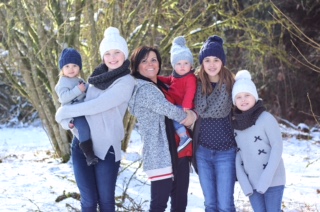
We asked our staff to share what "what I do matters" means to them in just six words. Read one hospice nurse's story behind her six word story.
My six word story is “Walk in someone else’s shoes today.”
As a hospice nurse, I am honored to be a part of the patient and family's journey as they make the transition from this life to death. Providing the patient and family with respect, dignity and compassion is something I strive to do on a daily basis. One of the ways I maintain this part of my daily practice is by "walking in their shoes." I continually remind myself to consider what the patient and family may be feeling at any given moment. Following this philosophy has provided me with valuable insight into the lives of others and how to effectively interact with patients and their families.
I’d always had an interest in end of life care, and while working in long term care I had taken the Fraser Health palliative education courses. Then my mom was diagnosed with cancer. I returned to the Yukon to help with her palliative care and I was so impressed by the care and attention she received -- the care and attention everyone in our family received -- from the doctor and nurses who came to visit. They looked at my mom not as her disease but as someone with spiritual, psychological and social needs as well. That hit home with me
I was so thankful for everyone involved in my mom’s care that when I came back to work after my mom passed away, I wanted to be able to provide that kind of care to other people in similar situations.
Today I work at Holmberg House, a 10-bed hospice in Abbotsford. Every single day is different because our patients’ needs change on a daily basis, often even hourly or minute by minute. As a hospice nurse we do everything for the patient – we help manage symptoms, provide personal care and we touch on their spiritual, psychological, social and emotional needs, not just for patients but for their families and friends. Most importantly, I listen to what they need.
We build relationships so it’s difficult at times, and sad when people pass. But I am very honoured to be with someone at the end of life. It’s part of our journey in life: everyone dies. To be able to make that person’s transition from this life to whatever may be next for us, I find that quite an honour and I’m blessed to be part of their journey.
Each person has a unique, individual story and I am blessed and honored to have them share that story with me. It is heartwarming to know and see people be so appreciative and find gratitude even in the most difficult time in their lives. This encourages me to have a positive, uplifting attitude.

